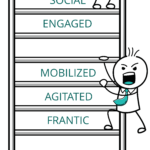Understanding Trauma
Janina Fisher, Healing the Fragmented Selves of Trauma Survivors
“If the brain and body are inherently adaptive, then the legacy of trauma response must also reflect an attempt at adaptation, rather than evidence of pathology. Through that neurobiological lens, what appears clinically as stuckness and resistance, untreatable diagnoses, or character-disordered behavior simply represent how an individual’s mind and body adapted to a dangerous world in which the only “protection” was the very same caretaker who endangered him or her. Each symptom was an ingenious solution by the body to create some semblance of safety for the developing child or endangered adult. The trauma-related issues with which the client present for help, I now believe, are in truth a “red badge of courage” that tells the story of what happened even more eloquently than the events each individual consciously remembers.”
Trauma & Shame
Creating parts helps us survive but also has long-term consequences if we are unable to integrate these needs. Often the left brain harshly judges the right brains coping strategies and the right feels abandoned by the left. This often leads to feelings of hypocrisy, shame, self-hatred and self-alienation…
Adverse Childhood Experiences (ACEs)
ACEs are stressful or traumatic events experienced during childhood that have a strong, graded relationship with life-long negative health outcomes. What’s graded relationship you ask? Well that means that for each additional ACE one accumulates more risk like taking another dose. For example, if one ACE increases your risk by 10% then two ACEs might increase your risk by 20%, and three by 30%…

Trauma & The Autonomic Ladder
The Autonomic Ladder is a concept used describe the different levels of response that our body can have to stress and danger. The ladder has three main rungs, each representing a different level of response controlled by different parts of the nervous system…
The Window of Tolerance
When someone is within their window of tolerance, they are able to manage their emotions and react appropriately to different situations. However, when someone is outside of their window of tolerance, they may be overwhelmed and unable to regulate their emotions…
Traumatic Memory
Trauma has a significant impact on memory, it can alter the way memories are formed, stored, and recalled. Trauma survivors may experience intrusive memories, dissociation and difficulty in forming new memories…




